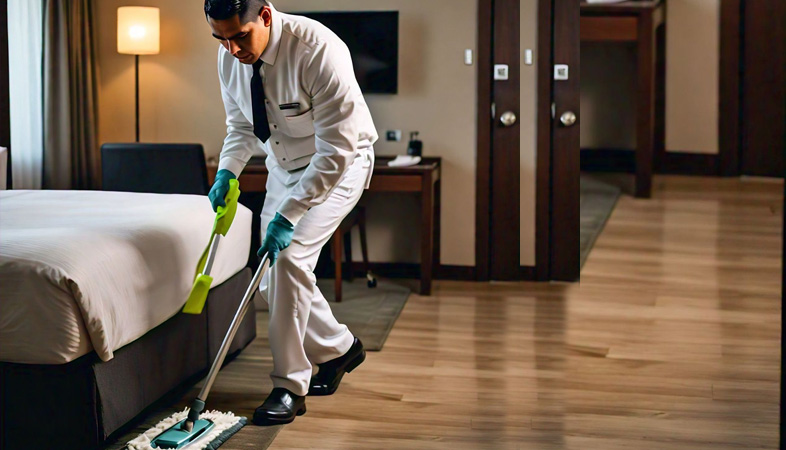The Impact of Housekeeping on Hotel Turnaround Times and Guest Satisfaction
A streamlined, effective housekeeping operation can enhance the guest experience, while poor management can result in delays, complaints, and negative reviews.
In the hotel industry, the efficiency of housekeeping plays
a crucial role in determining both turnaround times and overall guest
satisfaction. The process of cleaning and preparing rooms for new guests is not
only essential for maintaining high standards of cleanliness but also impacts
the speed at which hotels can accommodate arriving guests. A streamlined,
effective housekeeping operation can enhance the guest experience, while poor
management can result in delays, complaints, and negative reviews.
One of the key areas where housekeeping impacts hotel turnaround times is in the cleaning and preparation of guest rooms. In many hotels, the process of turning over rooms involves cleaning, restocking, and ensuring that the room is in pristine condition for new guests. If the housekeeping team is slow or inefficient, it can lead to delays in room availability, leaving guests waiting for extended periods. This is especially problematic during busy periods, such as check-in times or high-occupancy seasons, when guests expect quick and seamless room readiness. A delayed check-in due to slow housekeeping can start the guest's experience on a negative note, affecting their overall satisfaction.
Effective communication between housekeeping and the front desk is another critical factor in reducing turnaround times. The front desk relies on housekeeping to update room statuses promptly, ensuring that guests are informed about room availability in real-time. When housekeeping teams work closely with the front desk, they can prioritize rooms based on guest needs and ensure that rooms are cleaned and ready as quickly as possible. Efficient collaboration can also help mitigate any unexpected issues, such as maintenance problems or room discrepancies, allowing the hotel to respond quickly and avoid delays.
On the other hand, poor housekeeping practices, such as inconsistent cleaning standards or missed tasks, can negatively affect the guest experience. Guests expect their rooms to be spotless and comfortable when they check in. If a room has been poorly cleaned, it can lead to dissatisfaction and complaints, which may even result in requests for room changes or refunds. This can cause further delays and disrupt the flow of the hotel’s operations. A guest who encounters cleanliness issues upon check-in is likely to be less forgiving, and this can lead to negative reviews and diminished guest loyalty.
Housekeeping also directly impacts guest satisfaction by contributing to the overall comfort and ambiance of the hotel. A clean, well-maintained room is essential for making a positive first impression and creating a welcoming atmosphere. Freshly laundered linens, spotless bathrooms, and well-kept furniture all contribute to a sense of comfort and relaxation, making guests feel at home. When housekeeping goes the extra mile—such as leaving thoughtful touches like towel animals, fragrant scents, or personalized notes—it enhances the guest’s experience and fosters a feeling of care and attention to detail. Small gestures like these can go a long way in improving guest satisfaction and encouraging repeat visits.
Turnaround times in housekeeping can be further improved with the integration of technology. Many hotels are adopting modern solutions, such as mobile apps or housekeeping management software, to streamline operations. These tools allow housekeeping teams to track room statuses, receive real-time updates from the front desk, and manage cleaning schedules more effectively. In addition, smart devices like automated cleaning robots and energy-efficient appliances can reduce the amount of time needed to clean each room, allowing staff to clean and prepare more rooms in less time. By embracing these technologies, hotels can enhance both the efficiency of housekeeping and the quality of service they provide.
Housekeeping has a profound impact on both hotel turnaround times and guest satisfaction. Efficient, well-organized housekeeping operations enable hotels to minimize delays and provide a seamless experience for guests, ensuring that rooms are ready for check-in without unnecessary wait times. On the flip side, ineffective housekeeping practices can result in delays, cleanliness issues, and guest complaints that damage the hotel's reputation and affect customer loyalty. By prioritizing effective communication, investing in technology, and training staff to meet high standards, hotels can create a positive guest experience that encourages repeat business and enhances their overall success. Ultimately, housekeeping is more than just a behind-the-scenes operation; it’s a key factor in delivering the exceptional service that guests expect and deserve.
.png)




























